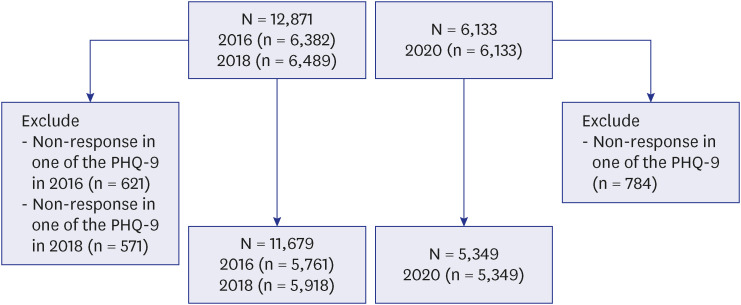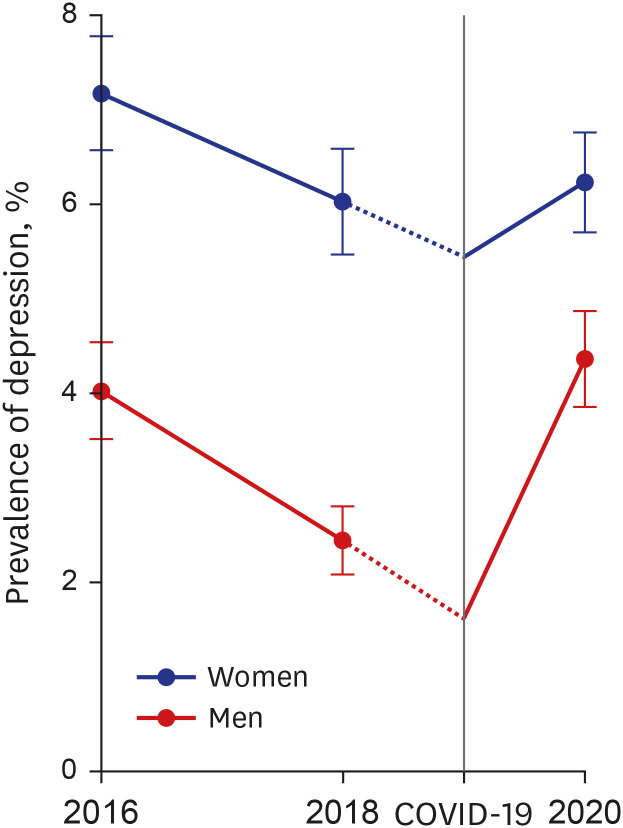J Korean Med Sci.
2023 Feb;38(6):e36. 10.3346/jkms.2023.38.e36.
Impact of the COVID-19 Pandemic on Gender Differences in Depression Based on National Representative Data
- Affiliations
-
- 1Department of Preventive Medicine, College of Medicine, The Catholic University of Korea, Seoul, Korea
- 2Department of Psychiatry, College of Medicine, The Catholic University of Korea, Seoul, Korea
- 3Clinical Research Coordinating Center, Catholic Medical Center, Seoul, Korea
- KMID: 2539488
- DOI: http://doi.org/10.3346/jkms.2023.38.e36
Abstract
- Background
Restrictions on daily life and changes in economic structure due to coronavirus disease 2019 (COVID-19) likely would have affected men and women differently. However, there is still a lack of research on the difference between men and women in the amount of change in depression during COVID-19 compared to before COVID-19. Therefore, the researchers investigated gender differences in the magnitude of increase in the prevalence of depression with its severity and individual symptoms during COVID-19 compared with prepandemic levels.
Methods
The Korea National Health and Nutrition Examination Survey (KNHANES) 2016 and 2018 were used to assess depression levels pre-pandemic and the KNHANES 2020 for pandemic depression levels. Depression was evaluated using the Patient Health Questionnaire-9 (PHQ-9). To analyze the differences between men and women in the magnitude of the mental health impact of COVID-19, the researchers analyzed the weighted differences in depression prevalence, severity, and individual symptoms during the COVID-19 pandemic compared to before COVID-19 stratified by gender.
Results
In men, there were significant increases in weighted prevalence for depression (1.2% percentage point; 95% confidence interval [CI], 0.0–2.3) and severe symptoms of depression (2.6-fold; 95% CI, 1.2–5.7). Among the individual symptoms of depression, significant increases during the pandemic compared to before were: little interest or pleasure in doing things, 1.26-fold; feeling tired or having little energy, 2.2-fold; and suicidal thoughts, 1.7-fold. However, there was no significant difference in prevalence, symptoms severity, and any symptom before and during COVID-19 in women.
Conclusions
Because the pandemic is likely to increase mental problems of the affected over time due to such problems as financial stress and joblessness or post-infection health issues, the researchers anticipate an increase in the prevalence of some mental illnesses. In particular, since the suicide rate of men is higher than that of women, from a public health perspective, active interventions are needed to prevent an increase in the suicide rate due to COVID-19. It is also necessary to establish national policies to overcome the psychological, social, and economic losses resulting from COVID-19.
Keyword
Figure
Reference
-
1. Bueno-Notivol J, Gracia-García P, Olaya B, Lasheras I, López-Antón R, Santabárbara J. Prevalence of depression during the COVID-19 outbreak: a meta-analysis of community-based studies. Int J Clin Health Psychol. 2021; 21(1):100196. PMID: 32904715.
Article2. Cramer AO, Borsboom D, Aggen SH, Kendler KS. The pathoplasticity of dysphoric episodes: differential impact of stressful life events on the pattern of depressive symptom inter-correlations. Psychol Med. 2012; 42(5):957–965. PMID: 22093641.
Article3. Weissman MM, Klerman GL. Sex differences and the epidemiology of depression. Arch Gen Psychiatry. 1977; 34(1):98–111. PMID: 319772.
Article4. Kim TJ, von dem Knesebeck O. Perceived job insecurity, unemployment and depressive symptoms: a systematic review and meta-analysis of prospective observational studies. Int Arch Occup Environ Health. 2016; 89(4):561–573. PMID: 26715495.
Article5. Boettcher N, Mitchell J, Lashewicz B, Jones E, Wang J, Gundu S, et al. Men’s work-related stress and mental health: illustrating the workings of masculine role norms. Am J Men Health. 2019; 13(2):1557988319838416.
Article6. Hadar-Shoval D, Alon-Tirosh M, Asraf K, Tannous-Haddad L, Tzischinsky O. The association between men’s mental health during COVID-19 and deterioration in economic status. Am J Men Health. 2022; 16(2):15579883221082427.
Article7. Oh K, Kim Y, Kweon S, Kim S, Yun S, Park S, et al. Korea National Health and Nutrition Examination Survey, 20th anniversary: accomplishments and future directions. Epidemiol Health. 2021; 43:e2021025. PMID: 33872484.
Article8. Kroenke K, Spitzer RL, Williams JB, Löwe B. The Patient Health Questionnaire Somatic, Anxiety, and Depressive Symptom Scales: a systematic review. Gen Hosp Psychiatry. 2010; 32(4):345–359. PMID: 20633738.
Article9. Han C, Jo SA, Kwak JH, Pae CU, Steffens D, Jo I, et al. Validation of the Patient Health Questionnaire-9 Korean version in the elderly population: the Ansan Geriatric study. Compr Psychiatry. 2008; 49(2):218–223. PMID: 18243897.
Article10. Ahn JY, Seo ER, Lim KH, Shin JH, Kim JB. Standardization of the Korean version of screening tool for depression (Patient Health Questionnaire-9, PHQ-9. J Korean Soc Biol Ther Psychiatry. 2013; 19:47–56.11. Dimick JB, Ryan AM. Methods for evaluating changes in health care policy: the difference-in-differences approach. JAMA. 2014; 312(22):2401–2402. PMID: 25490331.
Article12. Vilovna AL, Sergeevna SE. Coronavirus impact on the global economy. Sci Rev Theory Pract. 2020; 10(10):2491–2498.
Article13. International Labour Organization (ILO). ILO Monitor: COVID-19 and the World of Work. Seventh Edition Updated Estimates and Analysis. Geneva, Switzerland: International Labour Organization;2021.14. Lee J, Yang HS. Pandemic and employment: evidence from COVID-19 in South Korea. J Asian Econ. 2022; 78:101432. PMID: 34931110.
Article15. Ahmed MZ, Ahmed O, Aibao Z, Hanbin S, Siyu L, Ahmad A. Epidemic of COVID-19 in China and associated psychological problems. Asian J Psychiatr. 2020; 51:102092. PMID: 32315963.
Article16. Gualano MR, Lo Moro G, Voglino G, Bert F, Siliquini R. Effects of Covid-19 lockdown on mental health and sleep disturbances in Italy. Int J Environ Res Public Health. 2020; 17(13):4779. PMID: 32630821.
Article17. Xiong J, Lipsitz O, Nasri F, Lui LM, Gill H, Phan L, et al. Impact of COVID-19 pandemic on mental health in the general population: a systematic review. J Affect Disord. 2020; 277:55–64. PMID: 32799105.
Article18. Kim YS. KLSI Issue Paper No. 129 (2020-10). The Coronavirus Crisis and the Employment Trend in April 2020. Seoul, Korea: Korea Labor & Society Institute;2020.19. Song SH. Coupang now among 3 biggest employers in Korea. The Korea Herald;2020. 11. 17.20. Wahlbeck K, McDaid D. Actions to alleviate the mental health impact of the economic crisis. World Psychiatry. 2012; 11(3):139–145. PMID: 23024664.
Article21. Gili M, López-Navarro E, Castro A, Homar C, Navarro C, García-Toro M, et al. Gender differences in mental health during the economic crisis. Psicothema. 2016; 28(4):407–413. PMID: 27776609.22. Ando S, Nishida A, Usami S, Koike S, Yamasaki S, Kanata S, et al. Help-seeking intention for depression in early adolescents: associated factors and sex differences. J Affect Disord. 2018; 238:359–365. PMID: 29908475.
Article23. Parker G, Brotchie H. Gender differences in depression. Int Rev Psychiatry. 2010; 22(5):429–436. PMID: 21047157.
Article24. Chang Q, Yip PS, Chen YY. Gender inequality and suicide gender ratios in the world. J Affect Disord. 2019; 243:297–304. PMID: 30261445.
Article25. de Menezes Galvão AC, Almeida RN, de Sousa GM Jr, Leocadio-Miguel MA, Palhano-Fontes F, de Araujo DB, et al. Pathophysiology of major depression by clinical stages. Front Psychol. 2021; 12:641779. PMID: 34421705.
Article26. Lighthall NR, Mather M, Gorlick MA. Acute stress increases sex differences in risk seeking in the balloon analogue risk task. PLoS One. 2009; 4(7):e6002. PMID: 19568417.
Article27. Kluen LM, Agorastos A, Wiedemann K, Schwabe L. Cortisol boosts risky decision-making behavior in men but not in women. Psychoneuroendocrinology. 2017; 84:181–189. PMID: 28750292.
Article28. Youssef FF, Bachew R, Bissessar S, Crockett MJ, Faber NS. Sex differences in the effects of acute stress on behavior in the ultimatum game. Psychoneuroendocrinology. 2018; 96:126–131. PMID: 29940425.
Article29. Nikolova YS, Bogdan R, Brigidi BD, Hariri AR. Ventral striatum reactivity to reward and recent life stress interact to predict positive affect. Biol Psychiatry. 2012; 72(2):157–163. PMID: 22534456.
Article30. Luking KR, Nelson BD, Infantolino ZP, Sauder CL, Hajcak G. Ventral striatal function interacts with positive and negative life events to predict concurrent youth depressive symptoms. Biol Psychiatry Cogn Neurosci Neuroimaging. 2018; 3(11):937–946. PMID: 30409389.
Article31. Cunningham S, Mazurka R, Wynne-Edwards KE, Milev RV, Pizzagalli DA, Kennedy S, et al. Cortisol reactivity to stress predicts behavioral responsivity to reward moderation by sex, depression, and anhedonia. J Affect Disord. 2021; 293:1–8. PMID: 34153656.
Article32. Shi P, Yang A, Zhao Q, Chen Z, Ren X, Dai Q. A Hypothesis of gender differences in self-reporting symptom of depression: implications to solve under-diagnosis and under-treatment of depression in males. Front Psychiatry. 2021; 12:589687. PMID: 34759845.
Article33. Welton RS. The management of suicidality: assessment and intervention. Psychiatry (Edgmont Pa). 2007; 4(5):24–34.34. Kim AM. The short-term impact of the COVID-19 outbreak on suicides in Korea. Psychiatry Res. 2021; 295:113632. PMID: 33338860.
Article35. Ko M, Cho HM, Park J, Chi S, Han C, Yi HS, et al. Impact of the coronavirus disease pandemic on mental health among local residents in Korea: a cross sectional study. J Korean Med Sci. 2021; 36(46):e322. PMID: 34845878.
Article
- Full Text Links
- Actions
-
Cited
- CITED
-
- Close
- Share
- Similar articles
-
- A Study on the Influences of the COVID-19 Pandemic-related Depression, Anxiety, Stress, and Treatment-Crisis on Quality of Life in Cancer Patients
- The coronavirus disease 2019 pandemic and chronic diseases
- The Impact of Fear and Perception of Infection Risk on Depression among Service Workers during Covid-19
- Depression in pregnant and postpartum women during COVID-19 pandemic: systematic review and meta-analysis
- The COVID-19 pandemic's impact on prostate cancer screening and diagnosis in Korea



